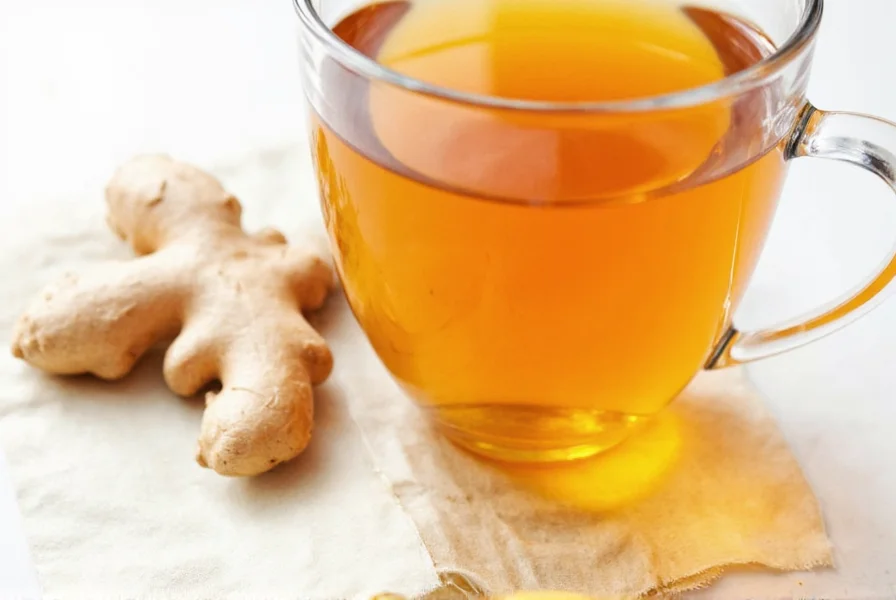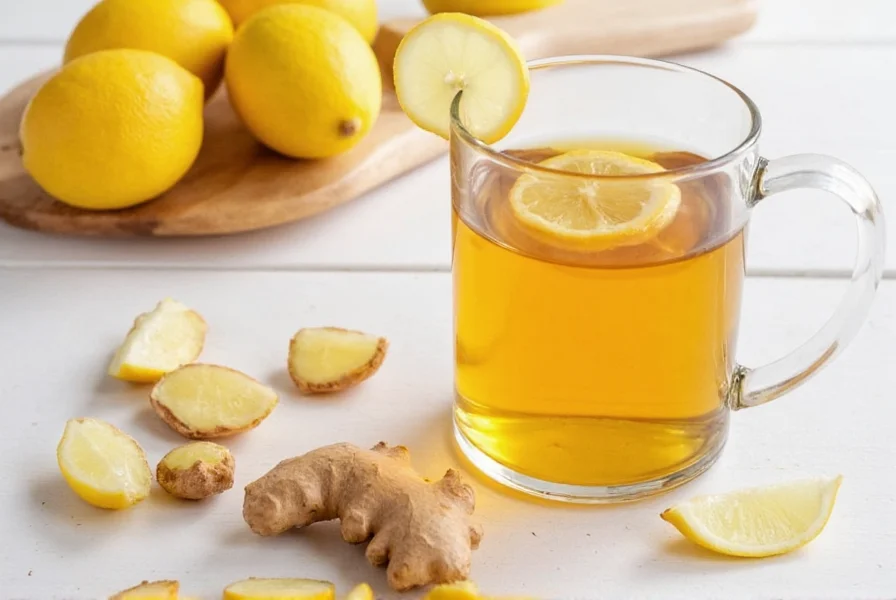Based on current scientific evidence, ginger tea may provide mild relief for some acid reflux symptoms due to its anti-inflammatory properties and potential to accelerate gastric emptying, but it's not a guaranteed solution and could potentially worsen symptoms in certain individuals. Research shows mixed results, with some studies indicating benefits while others suggest ginger might increase stomach acid production in sensitive people.
Acid reflux, also known as gastroesophageal reflux disease (GERD) when chronic, affects millions of people worldwide. As individuals increasingly seek natural remedies alongside conventional treatments, many wonder: is ginger tea good for acid reflux? Let's examine what current research tells us about this popular home remedy.
The Science Behind Ginger and Digestive Health
Ginger (Zingiber officinale) has been used for centuries in traditional medicine systems for digestive issues. The active compounds in ginger, particularly gingerols and shogaols, demonstrate anti-inflammatory and antioxidant properties that may benefit digestive health.
A 2020 review published in the journal Nutrients examined ginger's effects on gastrointestinal disorders. Researchers found that ginger may help accelerate gastric emptying, which is significant because delayed gastric emptying is a common factor in acid reflux. When food stays in the stomach longer, pressure increases, potentially forcing stomach contents back up into the esophagus.

What Research Says About Ginger Tea for Acid Reflux
The evidence regarding ginger tea specifically for acid reflux presents a nuanced picture:
- Potential benefits: A 2011 study in Molecular Research and Food Nutrition found that ginger root extract could inhibit the growth of H. pylori bacteria, which is associated with stomach ulcers and may contribute to reflux symptoms in some individuals.
- Gastric motility: Research in the European Journal of Gastroenterology & Hepatology suggests ginger may improve gastric motility, potentially reducing the likelihood of reflux episodes.
- Anti-inflammatory effects: Chronic inflammation in the esophagus is common in GERD patients. Ginger's anti-inflammatory properties might help reduce this inflammation.
However, it's important to note that most studies examine ginger in various forms rather than specifically ginger tea. Additionally, some research indicates ginger might stimulate gastric acid secretion in certain individuals, which could potentially worsen reflux symptoms.
| Research Findings on Ginger and Acid Reflux | Study Type | Key Findings |
|---|---|---|
| Ginger extract effects on H. pylori | In vitro study (2011) | Ginger inhibited H. pylori growth, potentially reducing ulcer risk |
| Ginger and gastric emptying | Human clinical trial (2008) | Ginger accelerated gastric emptying by 25% compared to placebo |
| Ginger for nausea and digestive issues | Systematic review (2020) | Positive effects on nausea, but limited specific evidence for GERD |
How Ginger Tea Might Help (or Harm) Acid Reflux
Understanding does ginger tea help with acid reflux requires examining both potential mechanisms of benefit and possible drawbacks:
Potential Benefits
- Natural anti-inflammatory: May reduce inflammation in the esophagus caused by acid exposure
- Gastric motility improvement: Faster stomach emptying reduces pressure that causes reflux
- Nausea reduction: Ginger is well-documented for reducing nausea, which often accompanies severe reflux
- Lower acidity than other beverages: Unlike coffee or citrus drinks, ginger tea is less likely to trigger reflux
Potential Concerns
- Stimulating effect: Ginger may increase stomach acid production in some individuals
- Spicy nature: The pungent compounds in ginger might irritate sensitive esophageal tissue
- Individual variation: Responses to ginger vary significantly between people
- Concentration matters: Strong ginger tea may be more problematic than mild preparations
How to Safely Try Ginger Tea for Acid Reflux
If you're considering ginger tea for heartburn relief, follow these evidence-based recommendations:
- Start with weak tea: Use 1/4 to 1/2 teaspoon of grated ginger per cup of water rather than stronger preparations
- Timing matters: Drink ginger tea between meals rather than with food to avoid increasing stomach volume
- Monitor your response: Keep a symptom diary for 1-2 weeks to track any improvements or worsening
- Avoid right before bed: Don't consume ginger tea within 3 hours of lying down
- Combine with other strategies: Use ginger tea as part of a comprehensive approach including dietary changes and proper meal timing

When Ginger Tea Might Not Be Appropriate
Certain individuals should exercise caution or avoid ginger tea for acid reflux:
- Those with known ginger sensitivity or allergies
- People taking blood thinners (ginger has mild anticoagulant properties)
- Individuals with gallstone disease
- People experiencing severe esophageal inflammation
- Those already taking medications that increase stomach acid production
If you notice your reflux symptoms worsening after drinking ginger tea, discontinue use immediately. This reaction suggests ginger might be stimulating excess acid production in your particular physiology.
Ginger Tea vs. Other Natural Remedies for Acid Reflux
When evaluating is ginger good for GERD compared to other natural approaches:
- Aloe vera juice: Has soothing properties but less evidence for improving gastric motility
- Slippery elm: Forms a protective coating but doesn't address the underlying motility issues
- Chamomile tea: More calming but lacks ginger's potential motility-enhancing effects
- Apple cider vinegar: Controversial approach that may help some but worsens symptoms in others
Ginger's potential advantage lies in its dual action—possibly reducing inflammation while improving gastric emptying. However, individual responses vary significantly, making personal experimentation under medical guidance important.
When to Consult a Healthcare Professional
While exploring natural remedies for acid reflux with ginger, remember that persistent or severe symptoms require medical evaluation. Consult a healthcare provider if you experience:
- Symptoms more than twice weekly
- Difficulty swallowing
- Unintended weight loss
- Nighttime symptoms that disrupt sleep
- Symptoms that don't improve with over-the-counter treatments
Chronic acid reflux can lead to complications like esophagitis, Barrett's esophagus, or even esophageal cancer if left untreated. A healthcare provider can help determine whether ginger tea might complement your specific treatment plan or if other approaches would be more appropriate.
Practical Tips for Using Ginger Tea Effectively
For those wanting to try how to prepare ginger tea for acid reflux, consider these evidence-based suggestions:
- Use fresh ginger rather than powdered for more controlled potency
- Peel the ginger to reduce potential irritants in the skin
- Brew with water just below boiling (195-200°F) to preserve active compounds
- Limit to 1-2 cups daily when first trying it for reflux
- Avoid adding honey or sugar, which might trigger reflux in some people
- Consider combining with a small amount of licorice root (DGL), which has additional soothing properties
Conclusion: A Nuanced Approach to Ginger Tea and Acid Reflux
The question is ginger tea good for acid reflux doesn't have a simple yes-or-no answer. Current evidence suggests ginger tea may provide modest benefits for some individuals with mild reflux symptoms due to its potential effects on gastric motility and inflammation. However, it's not a universal solution and might even exacerbate symptoms in certain people.
As with any natural remedy, individual responses vary significantly. The most effective approach involves careful experimentation while monitoring your symptoms, ideally under the guidance of a healthcare provider. Ginger tea should be viewed as a potential complementary approach rather than a replacement for conventional treatments, especially for moderate to severe GERD.
Frequently Asked Questions
Does ginger tea help with acid reflux immediately?
Ginger tea doesn't typically provide immediate relief for acute acid reflux episodes. Its potential benefits are more likely to be noticed with regular, consistent use over time as it may help improve gastric motility and reduce inflammation. For immediate relief of heartburn symptoms, over-the-counter antacids are generally more effective.
How much ginger tea should I drink for acid reflux?
When starting with ginger tea for acid reflux, begin with 1/4 to 1/2 teaspoon of grated fresh ginger per cup of water, consumed once daily between meals. If well-tolerated after a week, you can gradually increase to 1-2 cups daily. Stronger preparations may increase the risk of worsening symptoms. Always monitor your body's response and discontinue if symptoms worsen.
Can ginger tea make acid reflux worse?
Yes, ginger tea can potentially worsen acid reflux in some individuals. While ginger may improve gastric emptying for many people, it can stimulate stomach acid production in others. Those with sensitive esophageal tissue may find the spicy compounds in ginger irritating. If you notice increased heartburn, regurgitation, or discomfort after drinking ginger tea, it's likely worsening your symptoms and should be discontinued.
What's the best time to drink ginger tea for acid reflux?
The optimal time to drink ginger tea for acid reflux is between meals, ideally 1-2 hours after eating and at least 3 hours before lying down. Morning or mid-afternoon are generally good times. Avoid drinking ginger tea with meals as this increases stomach volume, or right before bedtime as lying down with a full stomach increases reflux risk.
How does ginger tea compare to medications for acid reflux?
Ginger tea is not a replacement for prescription or over-the-counter acid reflux medications. While medications like PPIs or H2 blockers directly reduce stomach acid production, ginger tea may offer more subtle benefits by potentially improving gastric motility and reducing inflammation. Ginger tea might be used as a complementary approach alongside conventional treatments for mild symptoms, but should not replace prescribed medications without consulting a healthcare provider.










 浙公网安备
33010002000092号
浙公网安备
33010002000092号 浙B2-20120091-4
浙B2-20120091-4